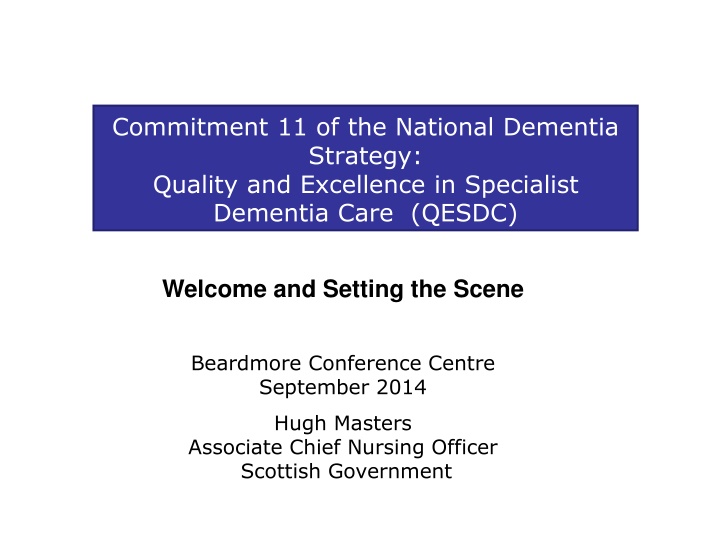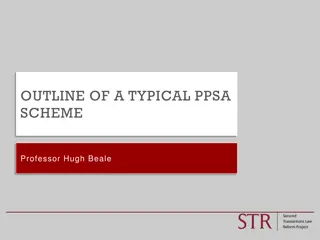
Specialist Dementia Care in Scotland: History, Importance, and Expectations
Explore the implementation of Commitment 11 from the National Dementia Strategy in Scotland, focusing on the history, significance of Specialist Dementia Care areas, current importance, and expectations. Learn about the evolving landscape of dementia care provision in NHS facilities and the critical role played by healthcare professionals in providing quality care for individuals with advanced dementia.
Download Presentation

Please find below an Image/Link to download the presentation.
The content on the website is provided AS IS for your information and personal use only. It may not be sold, licensed, or shared on other websites without obtaining consent from the author. If you encounter any issues during the download, it is possible that the publisher has removed the file from their server.
You are allowed to download the files provided on this website for personal or commercial use, subject to the condition that they are used lawfully. All files are the property of their respective owners.
The content on the website is provided AS IS for your information and personal use only. It may not be sold, licensed, or shared on other websites without obtaining consent from the author.
E N D
Presentation Transcript
Commitment 11 of the National Dementia Strategy: Quality and Excellence in Specialist Dementia Care (QESDC) Welcome and Setting the Scene Beardmore Conference Centre September 2014 Hugh Masters Associate Chief Nursing Officer Scottish Government
Implementing Commitment 11 of the National Dementia Strategy What is the history? What is a Specialist Dementia Care area? Why is it important now? What are the expectations?
Implementing Commitment 11 of the National Dementia Strategy What do you think is the history? What do you think is a Specialist Dementia Care area? Why do you think it important now? What are your expectations?
Why are we here today? Dementia dialogue events 2012-13 these settings/Advanced dementia/end of life care Background work was developed from ground up by MHN leads 18 months ago NES Supporting change developed Commitment 11 included in the second National Dementia Strategy for Scotland Commitment 11 Implementation and Monitoring group has met and developed since August last year stakeholder workshop last October Communication with boards April 2014 MWC report Dignity and Respect
Setting the Scene There are around 1,800 NHS or NHS-paid for dementia continuing care or dementia specialist care beds in Scotland, providing some of the most complex, intensive and challenging care for people in the advanced stages of their dementia, frequently combined with other acute care needs associated with age and end of life
NHS Scotland Inpatient Facilities by NHS Board and Specialty: Psychiatry of Old age ISD Scotland September 2013 Average Available Staffed Beds 4,000 3,500 3,000 2,500 2,000 Average Available Staffed Beds 1,500 1,000 500 0 2004 2005 2006 2007 2008 2009 2010 2011 2012 2013 Indicator Financial Year Ending 31st March 2007 2008 3,100 2,965 2004 3,545 2005 3,299 2006 3,207 2009 2,823 2010 2,645 2011 2,484 2012 2,355 2013(2) 2,222 Average Available Staffed Beds 82.1 80.2 78.8 78.4 75.8 73.6 74.6 74.7 75.5 75.4 % Occupancy 158.8 150.3 144.7 149.5 144.3 141.7 140.0 138.3 134.4 136.2 Mean Stay (Days) per Episode 1.9 1.9 2.0 1.9 1.9 1.9 1.9 2.0 2.1 2.0 Throughput
35,000 30,000 29,886 29,069 28,351 27,735 27,05126,577 25,751 25,000 24,76024,19523,728 -21% 20,000 Psychiatry of old age Average Available Staffed Beds All Specialties Average Available Staffed Beds 15,000 10,000 5,000 3,545 3,299 3,207 3,100 2,965 2,823 2,645 2,484 -37% 2,355 2,222 0 2004 2005 2006 2007 2008 2009 2010 2011 2012 2013
Numbers of mental health residents at 31 March for selected NHS boards of treatment: changes over time Mental Health Hospital Inpatient Care: Trends up to 31 March 2013 Interim report for selected NHS boards of treatment Publication date 29 July 2014
Discharges from mental illness specialties in Scottish hospitals Percentage of patients discharged within 4 weeks of admission, by sex and age Year ending 31st March 2012
Policy and Priorities The 20:20 Healthcare Vision - everyone is able to live longer healthier lives at home, or in a homely setting and, that we will have a healthcare system where: We have integrated health and social care There is a focus on prevention, anticipation and supported self-management Hospital treatment is required, and cannot be provided in a community setting, day case treatment will be the norm Whatever the setting, care will be provided to the highest standards of quality and safety, with the person at the centre of all decisions There will be a focus on ensuring that people get back into their home or community environment as soon as appropriate, with minimal risk of re-admission
Scotlands Dementia Strategies 2010-2016 Scotland s National Dementia Strategy: 2013- 16
Mental Welfare Commission for Scotland Dignity and Respect: Dementia continuing care visits report (2014)
What we knowthe costs to people with dementia and families Hospitals can pose greater risks than for other patients Noisy, stressful, unfamiliar hospital environment can cause distress Difficult to communicate effectively with staff nutritional issues, physical and cognitive functioning decline, tissue viability and falls Independence and autonomy can be quickly eroded
The way we see dementia and dementia care models will reflect the way that the environment is designed and organised (Nele Spruytte 2014) Berger and Luckman (1966) The social construction of reality
Develop a safe and therapeutic environment: Shifting the Paradigm Safe - Environmental changes fabric Staffing attitudes, resource, specialist, skill mix, working patterns Therapeutic milieu deeper changes to culture/, for example? Therapeutic models - ?Recovery Dining and Social areas Single rooms Meaningful Activities Visiting hours Outdoor space
Develop a safe and therapeutic environment: Shifting the Paradigm ?New Paradigm ?Old Paradigm Treatment, Reablement, Rehabilitation and Recovery Multiple conditions Integrated holistic teams Therapeutic milieu New staffing skills, resource and environment Shared care with carers/family Primary and social care Treatment and Cure focus Single clinical speciality Separate - Mental Health/Geriatric specialists Clinical milieu Traditional staffing Professional care Secondary care
Develop a safe and therapeutic environment: Shifting the Paradigm Staffing attitudes, resource, specialist, skill mix, working patterns NHS Scotland Nursing and Midwifery Workload and Workforce Planning Tools
QESDC update Nov 2014 Self assessment Scrutiny Small grants AS Nurse Consultant Listening events and report NES education programme Dementia data benchmarking Wider discussions Continuing care, Care home sector workforce, recruitment and retention, specialist dementia care definitions,
Lets not forget the good news stories! For example: -Dementia Strategy actions e.g. resources -Education and training post/under graduate -OPAH mock inspections -MWC report audits and actions -Supporting Change Good practice examples across Scotland what services and practitioners have already been doing:
Overall, carers were positive about the quality of care within the units. 98% were satisfied with care (89% very satisfied , 9% fairly satisfied ) (MWC 2014; p.45)






















